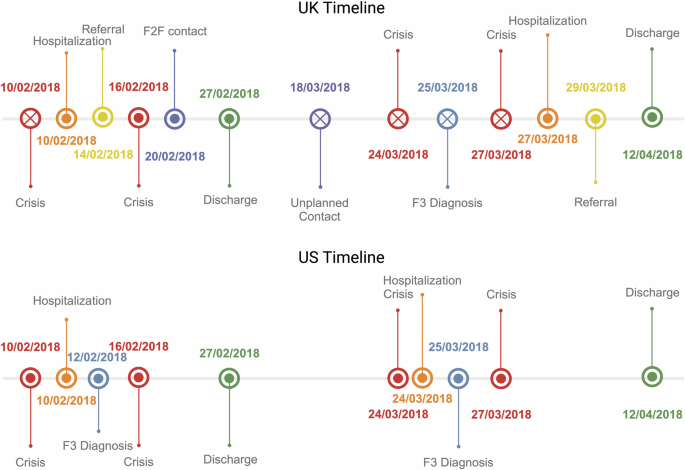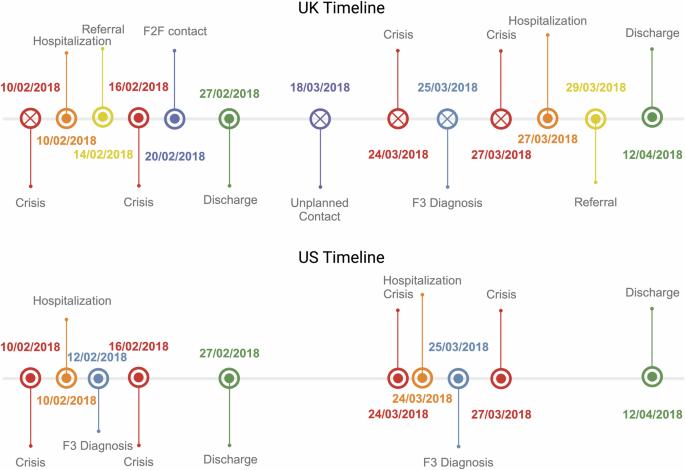预测心理健康危机的机器学习算法的跨大西洋可转移性和可复制性
IF 15.1
1区 医学
Q1 HEALTH CARE SCIENCES & SERVICES
引用次数: 0
摘要
要在医疗保健领域广泛采用机器学习,在不同医疗保健系统间转移和复制预测算法是一项独特而又关键的挑战,需要加以解决。在这项研究中,我们探讨了不同医疗系统和相关电子病历(EHR)之间的重要差异对机器学习算法的影响,这些算法可提前 28 天预测心理健康危机。我们评估了此类机器学习模型的可转移性和可复制性,为此,我们使用在英国伯明翰和索利赫尔心理健康 NHS 基金会信托基金会的电子病历数据上开发的特征和方法训练了六个模型。这些机器学习模型随后被用于预测 2018 年至 2020 年期间在美国拉什大学健康系统就诊的 2907 名患者的心理健康危机。其中最好的模型是根据美国特定的结构化特征和来自匿名病人笔记的频率特征组合训练出来的,其AUROC达到了0.837。最初使用英国结构化数据训练的一个性能相当的模型被转移到了美国数据上,然后使用美国数据进行了调整,取得了 0.826 的 AUROC。我们的研究结果证明了在不同医院系统中转移和复制机器学习模型以预测心理健康危机的可行性。本文章由计算机程序翻译,如有差异,请以英文原文为准。


Transatlantic transferability and replicability of machine-learning algorithms to predict mental health crises
Transferring and replicating predictive algorithms across healthcare systems constitutes a unique yet crucial challenge that needs to be addressed to enable the widespread adoption of machine learning in healthcare. In this study, we explored the impact of important differences across healthcare systems and the associated Electronic Health Records (EHRs) on machine-learning algorithms to predict mental health crises, up to 28 days in advance. We evaluated both the transferability and replicability of such machine learning models, and for this purpose, we trained six models using features and methods developed on EHR data from the Birmingham and Solihull Mental Health NHS Foundation Trust in the UK. These machine learning models were then used to predict the mental health crises of 2907 patients seen at the Rush University System for Health in the US between 2018 and 2020. The best one was trained on a combination of US-specific structured features and frequency features from anonymized patient notes and achieved an AUROC of 0.837. A model with comparable performance, originally trained using UK structured data, was transferred and then tuned using US data, achieving an AUROC of 0.826. Our findings establish the feasibility of transferring and replicating machine learning models to predict mental health crises across diverse hospital systems.
求助全文
通过发布文献求助,成功后即可免费获取论文全文。
去求助
来源期刊

NPJ Digital Medicine
Multiple-
CiteScore
25.10
自引率
3.30%
发文量
170
审稿时长
15 weeks
期刊介绍:
npj Digital Medicine is an online open-access journal that focuses on publishing peer-reviewed research in the field of digital medicine. The journal covers various aspects of digital medicine, including the application and implementation of digital and mobile technologies in clinical settings, virtual healthcare, and the use of artificial intelligence and informatics.
The primary goal of the journal is to support innovation and the advancement of healthcare through the integration of new digital and mobile technologies. When determining if a manuscript is suitable for publication, the journal considers four important criteria: novelty, clinical relevance, scientific rigor, and digital innovation.
 求助内容:
求助内容: 应助结果提醒方式:
应助结果提醒方式:


